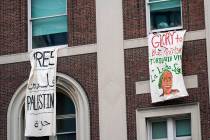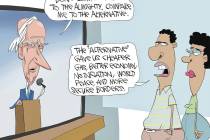Congress must curb SEIU’s health care imposition
The biggest threat facing hospitals today is not reimbursement cuts under Obamacare. It’s the American labor movement.
Faced with a decades-long decline in membership, labor unions — and the Service Employees International Union in particular — are angling to expand their signature combination of crippling work rules and inefficient management at local health care providers. If they’re successful, the mandate to “first do no harm” will be replaced by “first do no work not prescribed by union rules.”
The SEIU pushes the same tired mentality that has brutally hit the unionized auto industry, the unionized steel industry and unionized airlines, killing middle-class jobs and driving legendary marques such as Chrysler, Bethlehem Steel and Pan American World Airways into bankruptcy. Patients and hospitals are next under the gun.
Worse yet, the SEIU has a history of ignoring and attacking employee rights in the service of their campaigns; the hospital effort looks like it will be no exception. In Pittsburgh, the SEIU is pushing the University of Pittsburgh Medical Center to agree to a farcically named “neutrality agreement” that would muzzle management representatives and potentially include a card-check arrangement that abolishes the employees’ right to a secret-ballot vote in private on whether to pay union dues.
During these card-check drives, SEIU organizers hound employees — including at their homes — demanding they sign union cards. Employees frequently say they aren’t aware or are misled that signing a card means they want to unionize — oftentimes employees just want to hear both sides and have a private vote.
SEIU organizers and agitators are also potentially putting our health at risk by waging strikes, engaging in disruptions and even denying their members contract votes in order to advance their agenda against hospitals.
Nevada SEIU members are also discovering that their union is more interested in dues than democratic votes. In order to preserve the outdated longevity pay benefit for future hires — a concession other union workers in Clark County have made — the SEIU has denied its members at University Medical Center the opportunity to vote on a contract with a significant signing bonus. Already, SEIU represents workers at eight private-sector hospitals across the Las Vegas Valley.
And should SEIU not get what it wants, the results for patients could be dangerous. In Connecticut, striking SEIU nursing home attendants were accused of multiple incidents of sabotage. At one facility in Newington, management reported to police that the nameplates of Alzheimer’s patients were swapped — a very dangerous act that could lead to patients receiving the wrong medication.
Amid this epidemic of SEIU abuses against employees, union members and — worst of all — patients, Congress must act. Fortunately, a solution is already available: Sen. Orrin Hatch, R-Utah, and Rep. Tom Price, R-Ga., have introduced the Employee Rights Act, a package of labor reforms that would bring U.S. labor law into the 21st century. The ERA would guarantee employees secret ballots in unionization decisions, ensure that employees have a secret-ballot vote on whether to call a strike, and criminalize union officials’ threats and intimidation, which currently enjoy a semi-protected loophole in labor law.
All these provisions — and the four other key reforms in the act — have strong bipartisan support. In a recent national poll, union households back the secret-ballot union elections, secret-ballot strike votes and the criminalization of union threats with greater than 80 percent support.
But until the ERA becomes law, the SEIU will continue trying to squeeze itself between patients and quality health care, all the while promising, “This won’t hurt … much.”
Richard Berman is the executive director of the Center for Union Facts.























